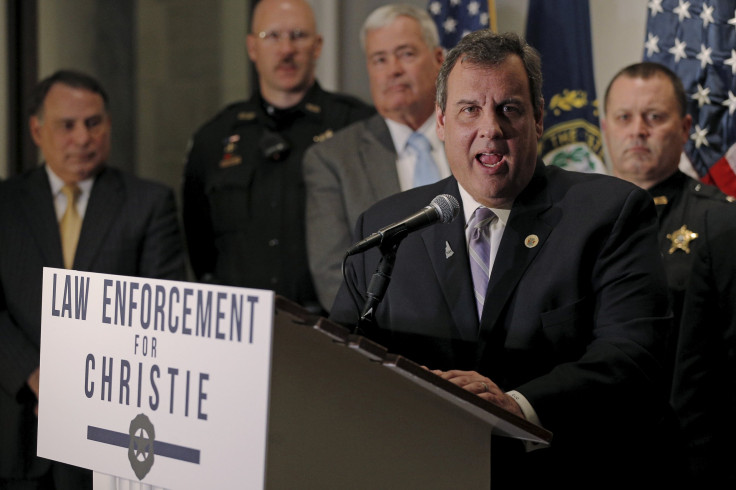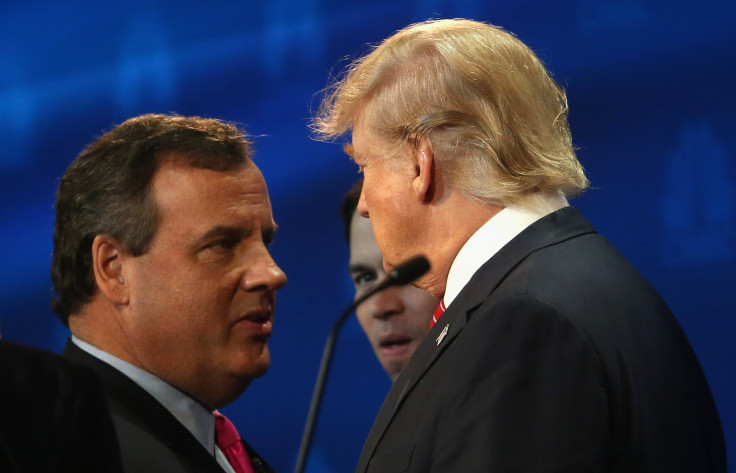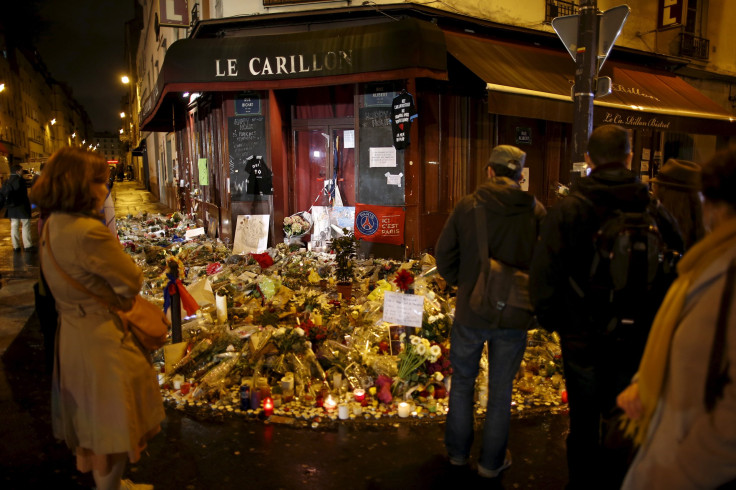Chris Christie In New Hampshire: Amid Attacks From Trump, Election 2016 Candidate Sees Rise In Polling Ahead Of State Primary

New Jersey Gov. Chris Christie plans on doing Friday exactly what he’s been doing for months now: holding a town hall meeting in New Hampshire and speaking to and with his supporters there. His bid for the White House has put an emphasis on such events, where he is skilled from years of practice in his home state.
Christie has been largely discounted in the Republican 2016 presidential race so far, but his all-in, personal approach in the Granite State, coupled with the focus he’s placed on national security and terrorism, seems at last to be paying off. While still recovering from a local transportation scandal that made national headlines, he's been steadily rising in the polls and racking up endorsements. But the fact that his surge has invited attacks from front-runner Donald Trump may be the best indicator of his progress.
“He went through a rough period and was tested and has come back,” said Stuart Stevens, a longtime Republican strategist and top adviser to the Mitt Romney 2012 campaign whose business partner is currently advising the Christie campaign. “That’s a constant in politics, in sports, in life. It draws people to you. It shows strength and character and resilience and all of those qualities that we like in people and we like in presidents.”
Christie entered the 2016 race with vastly dimmer prospects than four years earlier, when he turned down a presidential bid despite an eager Republican Party encouraging him to do so. When he announced his candidacy in June, he trailed far behind the field in national polls with just 3.2 percent of likely voters saying they were interested and near-record low favorability numbers. In the months that followed, Christie's polling continued to be less than inspiring. He dipped below 3 percent in September and was performing so badly that he wasn’t even invited to the top tier in the third Republican debate.
But Christie’s fortunes seem to be changing, at least in New Hampshire. Recent polls from the Public Policy Polling Institute and CNN/WMUR (a Manchester TV station) show a resurgent Christie, taking fourth and fifth place, respectively. What may be more important than that polling placement, however, is that Christie has reversed his underwater favorability ratings.
Christie was accused in late 2013, just after his re-election, of playing a crucial role in tying up traffic on the George Washington Bridge between New York and New Jersey as an act of political retribution in what has come to be known as “Bridgegate.” While no direct connection to Christie himself was ever established, the scandal slashed the positive public image he had enjoyed and sent his favorability ratings plummeting across the country.
Still, over the past three months, Christie has pulled off a rare feat in New Hampshire. In August, just 35 percent of primary voters in New Hampshire viewed him in a favorable light against 46 percent who viewed him unfavorably. In the most recent PPP poll, Christie had the best favorability among all of the candidates -- 61 percent positive to 22 percent negative – a 50 point swing.
“I think it’s pretty rare for somebody to have a reversal of fortune after somebody is so well known,” said Jim Williams, a polling analyst at PPP.

But, there’s another way to tell he’s doing well, aside from favorability polls. As Christie has seen his stock rise in New Hampshire, Trump has now turned his sights on New Jersey's governor. Revisiting the “Bridgegate” debate, Trump has recently been telling supporters at rallies that Christie knew about the traffic closure as it happened.
“You know that he is doing well because Donald Trump is starting to say he’s guilty on the bridge,” said Ford O’Connell, a former adviser for Republican Sen. John McCain’s 2008 presidential campaign who is unaffiliated with a 2016 race.
Christie’s potential return to grace can be compared to McCain in 2008, when the Arizona senator won New Hampshire after months of poor polls, O’Connell opined. In that cycle, McCain was widely viewed as the front-runner going in, but he dropped dramatically in the polls in 2007 because of his support for adding troops to the Iraq War. He eventually won the nomination. “There are some similarities in the sense that the path Christie is taking, he started out as one of the top two then he got slimed with ‘Bridgegate’… and now he’s on his resurgence.”
Christie’s rebound can be attributed to several additional factors, political analysts and observers said. New Hampshire prides itself as being a state that thinks independently and values one-on-one interaction between presidential hopefuls and voters.
Candidates for decades have put in much face time in the state to woo voters, and Christie is no different. Of the candidates in the 2016 field, he has spent some of the most time in New Hampshire – it’s his top early target – crisscrossing the state from town hall to town hall. It’s a format that he excels at, and his straight-talking style and knowledge of issues has proven appealing to voters and has attracted high-profile endorsements, including the recent coveted support from the New Hampshire Union-Leader.

But his revived appeal has bleaker origins to thank as well. Christie, who was U.S. attorney for New Jersey under President George W. Bush during and after the 9/11 terrorist attacks, regularly mentions his experience prosecuting terrorists. After the attacks in Paris and San Bernardino, California, national security, terrorism and foreign policy are now top campaign issues.
“Christie has an advantage over other governors in his experience after 9/11 and his experience with terrorism,” noted Andy Smith, a political science professor at the University of New Hampshire. “I think that has allowed him to separate himself from the other candidates and that has helped him at a time when voters are paying more attention to those policy issues.”
With just two months to the primary, picking up momentum now is key for Christie, even if he still has a long way to go. Trump’s lead in polls, experts say, could be misleading. Polls in New Hampshire, for all its quirks, can be fickle and nobody – not the candidates, not pundits and not even the voters themselves – know what the result will be come Feb. 9.
The New Hampshire race is still very much up for grabs, and any candidate could theoretically win in one of the early nominating states. “The reason is that people don’t make up their minds until the very end,” Smith said. “You’re asking people who they’re going to vote for when they don’t know who they’re going to vote for.”
© Copyright IBTimes 2024. All rights reserved.






















